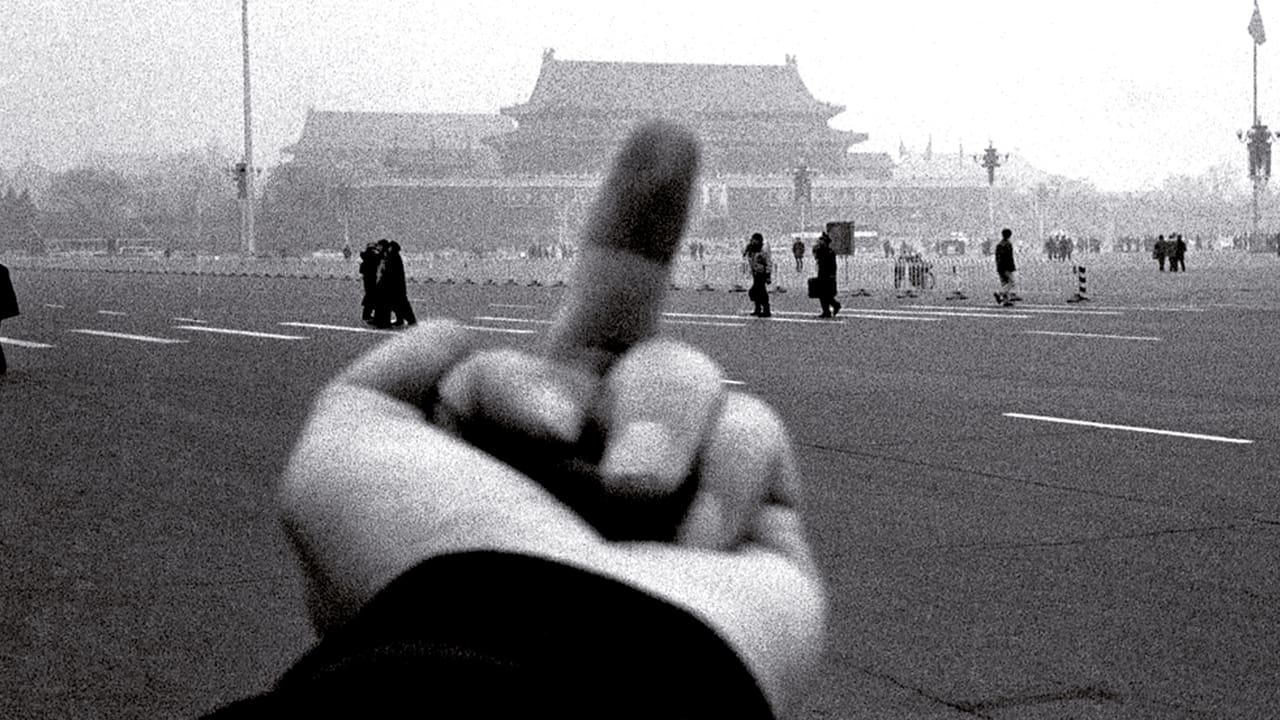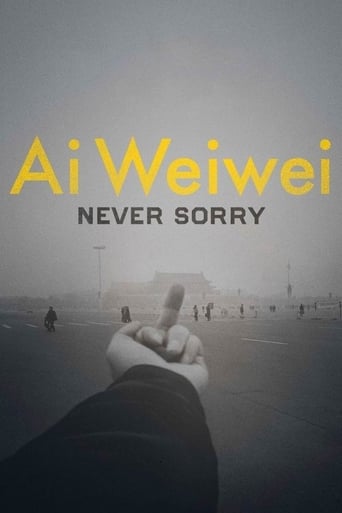



Expected more
Simple and well acted, it has tension enough to knot the stomach.
View MoreThere is just so much movie here. For some it may be too much. But in the same secretly sarcastic way most telemarketers say the phrase, the title of this one is particularly apt.
View MoreIf you're interested in the topic at hand, you should just watch it and judge yourself because the reviews have gone very biased by people that didn't even watch it and just hate (or love) the creator. I liked it, it was well written, narrated, and directed and it was about a topic that interests me.
View MoreAi Weiwei isn't just a hilarious name to say to any Englishman but also a name associated with freedom of speech in modern day China. An artist by trade, Mr Weiwei is now more (in)famous for saying 'fuck you' to the Chinese Government than putting any brush strokes to canvas.'Never Sorry' is the documentary from debut director Alison Klayman resulting from her four years following China's most famous artist as he travels around China and the world causing further and further headaches for local police and the Chinese Government. Concentrating as much on political acts than artistic ones, the film shows the importance of Twitter and social media in a country such as China, showing as many of his status updates throughout the film as Richard Herring will commit in a 90 minute period. The balance between politics and art is well maintained throughout, reminding that he has actually done some good works over the years - as well as breaking some old pots - while showing the political motivations in his work through interviews with various peers and colleagues over the last three decades.But saying 'fuck you' and breaking some vase-thing doesn't come without its fair share of problems. Various confrontations with police, sometimes violent, are shown, as well as his non-mysterious disappearance in 2011 and the momentary stem in the flow of his freedom of speech. The documentary is more about freedom of speech than a biopic of an artist, using him as an example of the impact of social networking, as well as what happens when the rules are broken.There are some weak points, such as the mystery around his son with a woman that isn't his wife – a topic that his wife is not questioned on and which he is coy – that is only mentioned and not explored; and his confrontation with police while sticking cameras in their faces probably provokes a response from law enforcement that would be met in most nations in the world. As noted, the fact that someone like Ai Weiwei exists shows that there has been some change in China over the years, though the fact that his words are met with such strong response from the Government shows that there is still a long way to go before China becomes a nation where people can freely express their opinions to the world on Twitter without fear of arrest and prosecution – unless, of course, you're a Premiership footballer.www.politic1983.blogspot.com
View MoreFor the things that people say . Sichuan appeared more or less I do not deny.But he saw only the problem,I hate , who has two sides.Two sides of things if you only care about the one hand, while ignoring the other hand , the result of the ability that you put it out is wrong.I'm sure at the people have not been to China , has been a long time have not been to China,See China in the with Decaying backward view.I can tell you , AI MO MO this man if he is in your country , you will hate .You in the West is very strong after the original capital accumulation , although China's rapid and stable development.But there is a great distance away from you,Western you with your concept of rules to measure the world has many years,Is he must be right !No, definitely not.You want the world to follow the development of your wishes , I can tell you , your power becomes increasingly weak.I can clearly tell you that your government spends much money to subvert the Chinese cause a lot of trouble to China every year, civilians die . A Soviet Union has been to topple , but China will not .We do not believe in God , we believe that our hands , I believe that the power of labor ; nor do we believe that your so-called democracy , we believe that our system . We may not be the best of peoples , but it is certainly an .Of course, some of us likeAI MO MO ,But they are small, can not keep us out into the future,Some of them will be forgotten , and some will always do nails like Jesus on the cross as shame was nailed in China. In a word, came to China to bring good meal time , in Post your comment
View MoreI must admit I knew virtually nothing about the Chinese dissident and artist Ai Weiwei before his detention and disappearance, in 2011, which made world headlines. This documentary, directed by Alison Klayman, does a fine job of capturing the life of Weiwei, who I found to be a very brave and charismatic figure. The film, I thought, was quite inspiring to me and also quite fascinating.The opening scenes show one of Weiwei's cats, who has learned to jump high and put his weight on a door handle and open the door, which is pretty amazing. Then Weiwei in his sly humor states that cats are different than humans because they have no inclination to close a door after they've opened it.His father was a renowned poet in China, but was sent into exile for re-education for 19 years. I imagine this is where Weiwei's iconoclastic spirit began. The movie traces his 12 years in New York City, where his brilliant art conceptions took root. When the crackdown in Tiananmen Square took place, in 1989, Weiwei participated in hunger strikes and demonstrations in protest. In 1993, he returned to China to be with his ailing father, who eventually passed away three years later.Most of the documentary focuses on Weiwei's continuing struggles to achieve more freedom for the Chinese people in a very authoritarian and controlled society. He seems to be in a continual struggle with the government, which shut his blog, surveilled his comings and goings, and even did nothing when security guards beat him in a hotel room, causing his brain to swell, nearly killing him.When the Sichuan earthquake struck China there were over 5,000 children killed, mostly from poor construction of schools, per the film. While the government wanted to keep the names of those who died secret, Weiwei began to identify all the children who died and had people from around the world read one name of each child on his Twitter page, to the consternation of the Chinese government.While some of his compatriots were imprisoned for speaking out against the authorities, such as Liu Xiaobo, Weiwei had escaped that fate. Many felt this was due to his worldwide notoriety, with his shows being so popular in many countries. However, in 2011, he was detained and for nine months held in seclusion. He was eventually released and apparently has slowly resumed his actions to achieve more freedom for the people there.The movie, I thought, was quite inspiring to me, and I found Weiwei's calm but revolutionary spirit to be quite special. The film also gives the viewers a seldom seen inside look at what's going on in China today.
View MoreAi Weiwei is an internationally acclaimed Chinese artist-activist who is provocatively condemning his motherland government for grave social underbellies (in light of an unbalanced economy acceleration) as corruption nonfeasance and misfeasance among officials, systematic injustice, moral languor and freedom repression (a focal point is the aftermath of Wenchuan earthquake in 2008, whose casualties are over 80,000, among which are many children stayed inside shoddily-built school buildings) and valiantly spearheading (not the least in the artist field) a new wave of self-awakening among his fellow compatriots, which has promptly wrought government's mistreatment and investigations, all up to a somewhat "mysterious" disappearance during 2011 for half an year, then later ostensibly claimed by the Chinese government as a series of tax evasion interrogations of Ai's company, then subsequently Ai has been forbid to neither leave Beijing for one-year nor to speak about the matter. So if one is all familiar with the story, this documentary has rather little novel to offer, first- time director Alison Klayman covers a quite comprehensive range to introduce Ai's art, family and the (short but carefully-selected) comments from his friends and peers, but all falls short of incisiveness and compassion. The family card is an omnipotent weapon to probe a more personal facet of the artist himself (his illegitimate son has been briefly discussed here) which could induce empathy for every single viewer, however, this is a common-law generally fits under any similar context, the real Ai Weiwei is still elusive and taciturn. With such a contentious figure, Klayman seems to choose a very conservative story-telling which is exuding from a sheer westerner's point-of-view (a lone fighter against the all-evil oriental and dictatorial institution, surely the truth is much more intricate as we all know), still a shred of information betrays Ai's hooliganism in his own tactic, which would arise more interest (at least for myself). All in all, the film has attest to that Weiwei is a true artist (he is not exploiting all the controversies to grandstand his art work) if nothing else, and by the way, if anyone who is really into Ai's artwork, this documentary is not recommended for you unless you have never heard of his ground-breaking SUNFLOWER SEEDS exhibition.
View More